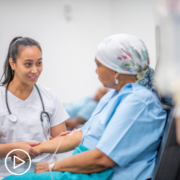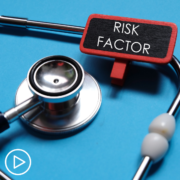Understanding Endometrial Cancer Risk: Factors Influencing Incidence and Mortality from Patient Empowerment Network on Vimeo.
What are endometrial cancer risk factors for patients should know about? Expert Dr. Emily Hinchcliff from Northwestern Medicine discusses endometrial cancer risk factors, incidence and mortality rates, and patient advice to help guard against endometrial cancer.
[ACT]IVATION TIP
“…lifestyle modification is really important here. Obesity is a known risk factor for endometrial cancer. So working with your primary care physician to try to improve your health more generally, especially as it surrounds weight, is really important in terms of endometrial cancer prevention. I also think it’s important to know…that obesity and changing your obesity can impact your cancer’s response to certain therapies, especially with hormonal therapy.”
Download Guide | Descargar Guía en Español
See More from [ACT]IVATED Endometrial Cancer
Related Resources:
Transcript:
Lisa:
Dr. Hinchcliff, for patients wondering about their risk, what are risk factors for endometrial cancer, and what should patients be aware of?
Dr. Emily Hinchcliff:
So I think that it’s really important to highlight that endometrial cancer is one of the few cancers that is actually increasing in both number and also mortality. The numbers from the American Cancer Society for 2024 are over 70,000 women, or around 70,000 women will be diagnosed, and around 13,000 women will die of their disease. And I think that unlike many cancers where we’re actually making progress, endometrial cancer, the incidence, how many people are getting it is rising. And it’s rising faster in non-white ethnicities and groups.
So as I think about risk factors, I think the important ones to highlight are certainly obesity. This I think is a large driver of why there is increasing incidence of endometrial cancer. This relates to kind of the hormonal regulation. Obesity results in increasing levels of estrogen that disproportionately affect the endometrium. And then similar to that, certain hormonal syndromes where women have irregular or infrequent periods like polycystic ovarian syndrome can also put them at higher risk. More globally, I think age, family history are also risk factors. And then as I mentioned, unfortunately, women who are non-white have a higher risk of endometrial cancer mortality, especially as relates to some of the higher risk endometrial cancer subtypes.
Lisa:
Do you have an activation tip for patients for that question?
Dr. Emily Hinchcliff:
Yeah, so I think that lifestyle modification is really important here. Obesity is a known risk factor for endometrial cancer. So working with your primary care physician to try to improve your health more generally, especially as it surrounds weight, is really important in terms of endometrial cancer prevention. I also think it’s important to know, given that this is often a patient audience that I’m speaking to, that obesity and changing your obesity can impact your cancer’s response to certain therapies, especially with hormonal therapy. So for women who are diagnosed with early stage endometrial cancer, for example, who may desire fertility preservation or may want to know what they can do to impact their own cancer care, I think that’s a really important point.
I guess I can also just bring up a quick one-liner regarding the recent publication of studies surrounding hair product use. So this is a question that we have been getting asked a lot after the publication of both the study and then the big New York Times article, but there was an NIH study that showed a potential association between hair product chemical straightener use and uterine cancer, especially for those who identify as frequent users. I think that the important key point here is that around 60 percent of the women who reported using hair products self-identified as Black and tend to initiate use earlier, so this is another risk factor that may be important.
Yeah, we’re still learning a lot more about that. Right now, there’s an unclear association in terms of what we should be doing about it.
Share Your Feedback












